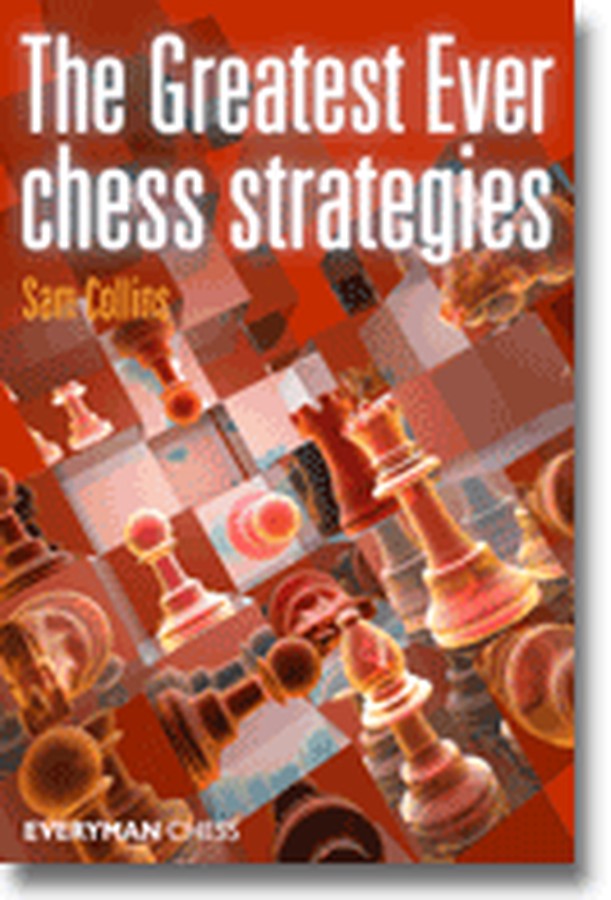| Nivå | B-D |
| Utgivelsesdato | Oktober 2012 |
| Forfatter | |
| Pris | 240 NOK |
The Greatest Ever Chess Strategies
Mest en bok om mønstergjenkjennelse, å kjenne igjen "typestillinger". IM Sam Collins viser mange av sjakkspillets viktige strategiske ideer som han også har benyttet i egne partier.
Boka inneholder hele partier og er nyttig for både åpningsspill, midtspill og sluttspill. Dette er først og fremst en instruktiv bok for sjakkstudenten, mindre av noen slags antologi av det aller ypperste i sjakkstrategi som boktittelen kunne høres ut som. Partiene er fra ulike epoker, og Collins har som hovedtemaer (kapitler i boka) bønder, løpere, materiell og dynamiske faktorer.
Boktitttelen blir riktig i betydningen at Collins framhever temaene i boka som mange av de viktigste innen sjakkstrategien.
Blant mange bøker om sjakkstrategi virker denne sannelig å være blant de aller mest praktisk nyttige. Kanskje aller mest for spillere innen ratingnivå cirka 1200 - 2200.
Fra forordet
"The situation has provided a cue; this cue has given the expert access to information stored in memory, and the information provides the answer. Intuition is nothing more and nothing less than recognition." Herbert Simon
"In the end I don't believe intuition is something you're born with. Aptitude is something you're born with, you may have a certain skill for something, but intuition is something you develop by looking at something over and over again. It's almost, I feel, like a way of...you can't quantify this information very well, but it's there, and something in your head is able to deal with it. So intuition you develop by simply working hard, by looking at chess daily, by looking at different kinds of positions, and every time you see the pieces interact, you get a better sense of how these things interplay. However, here the important thing is the breadth of knowledge that you have. You need to be very good even in areas that you might never use, or at least have some interest in areas that you might never use, because you never know when a mechanism that works in one area will suddenly be applicable in another. So the more broad your knowledge is in chess, the more structures and mechanisms you're familiar with, then the easier it is to deal with unexpected situations." Vishy Anand
One of the most interesting chess training ideas is that of "positional sketches", advocated by Mark Dvoretsky. He recommends that when you come across a particularly interesting idea, you should make a note of the position and why you found the idea so appealing. This can be recorded on paper or (inevitably) in a database, which will gradually build to form a personal library of standard concepts. While Dvoretsky's idea has a lot of intuitive appeal to me, it goes without saying that I don't have the discipline to consistently apply it. However, I often find myself thinking about a move and realizing that I am in a vaguely similar situa- tion to one I had seen before. This kind of knowledge (pattern recognition/ reasoning by analogy) is of enormous help since it helps us find the right path much more quickly than we would by brute calculation alone.
This book is my attempt to make sense of some of the chess concepts which are floating around in my head. I've presented the material much as it is categorized in my mind, so rather than formally similar situations being grouped together, I've sometimes picked a few examples on "Disruptive tactical moves with the b-pawn" or something similar. These ideas are not of equal importance or equal frequency, but they all have repeatedly cropped up in my own games or games I have seen and, basically, I think familiarity with any of them will make someone a slightly better player. I have tried to avoid covering material which is very well covered elsewhere (for instance, IQP positions, or a lot of the stuff in John Watson's wonderful two-volume series on strategy), and where these have cropped up (like the sections on Outposts or Open Files) I hope to have demonstrated something fresh or counterintuitive.
The final collection is, ultimately, slightly quirky and features rather too many of my own games (not even my best ones) but, to use the classic excuse, these are the games I understand the best and from which I hope to extract some instructive material." ...
| Innbundet? | Nei |
| Type | Bok |
| Språk | Engelsk |
| Antall sider | 176 |

